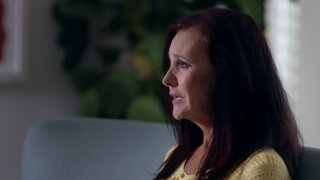Create a free profile to get unlimited access to exclusive videos, breaking news, sweepstakes, and more!
'Dirty John' Subject Debra Newell Is Speaking Out To Protect Victims of Coercive Control
Debra Newell was drawn into a relationship with a violent and manipulative con man, John Meehan, which inspired the show "Dirty John."
Debra Newell, an accomplished woman who fell victim to a charismatic conman which inspired the successful “Dirty John” podcast and television show, is now lobbying for efforts to protect victims of the dangerous form of abuse that altered her life.
On Monday, Newell sat on a panel with Los Angeles City Attorney Mike Feuer to speak out against coercive control — a calculated form of abuse that relies on isolation, control, and manipulation to dominate victims — and advocate for more efforts to protect victims.
"I feel the lobbying efforts in Los Angeles went well and my goal is to help and empower as many people as possible in these situations," Newell told Oxygen.com.
Newell was a victim of coercive control herself during her whirlwind relationship with John Meehan, a conman who pretended to be a successful and doting doctor to earn Newell’s trust. The reality — which was chronicled first in the “Dirty John” podcast and then in the dramatized version of the harrowing story on Bravo — was much darker.
Meehan had really been an ex-con with a drug problem and a string of restraining orders against him from past love interests, but initially he appeared to be the perfect partner. He ran countless errands for Newell, praised her beauty and abilities, and frequently told her how much he loved to be around her.
“I think in the beginning he was studying me to such a degree that he knew what to ask, what to say, what to do,” Newell said during the panel discussion.
She referred to Meehan’s continuous doting as “love bombing.”
Laura Richards, a criminal behavioral analyst who once ran the Homicide Prevention Unit for the New Scotland Yard and also spearheaded a law criminalizing coercive control in England and Wales, told Oxygen.com earlier this year that while these pseudo-caring tactics appear to be thoughtful and attentive, they have a much more sinister purpose.
“He wore a mask of one thing, but actually what was going on behind the scenes was that he was attentive to her because he was trying to get as much information about her as possible,” Richards said. “He filled in all the gaps of her life, so he enhanced her life. And what she understood was that he was doing all these jobs and things to highlight and lift her up to the highest potential, but actually, he was doing all these things to create codependency.”
Over time, Newell said Meehan began to isolate her and pull her away from her four children.
“At first you think, ‘Oh, this person is really in love with me,’ but then he would isolate me,” she said during the community discussion. “I’ve always been very close to my children and they’ve been part of my every day communication and so on and he started saying you need to cut them off, they are too dependent on you.”
Feuer described other examples of coercive control as telling someone what they can wear, dictating how they live their life, or “more sinister” efforts like tracking the victim’s movements, controlling the victim’s finances, or intimidating the victim with subtle threats.
It’s a form of abuse that is not as readily recognized in the United States as other forms of domestic abuse, like physical violence, but coercive control and stalking can end with fatal consequences for the victims.
“The time someone leaves is the highest risk time,” Richards told Oxygen.com. “Seventy-six percent of the murders happen on separation and roughly 80 percent happen within the first four months of separation.”
Advocates against domestic violence — including Newell — are hoping to increase awareness about the dangers of coercive control as they work to enhance education and advocate for new legislation that could better protect victims of the insidious form of abuse.
“Until we broaden our definition of what domestic violence and what domestic abuse really is, we’re going to be leaving victims without the assistance they need and we’re going to be complicit in perpetuating what is a pattern of behavior that we can — if we put our minds to it — stop,” Fleuer said.
Newell said after realizing how dangerous Meehan was, she went to four different police departments to try to get help, but was repeatedly turned away because she had no physical signs of abuse.
"The thing with the law is I went to four different police stations and I said, ‘I am in fear for my life, I am in fear of what this man’s going to do,’ I had all the papers on me of who he was — I think there were nine restraining orders against him amongst many other things — and they looked at me and they said, 'Oh, just go home, you know, it’s probably just a spat, a husband wife spat,' so nobody took me seriously," she said.
She was also denied a restraining order from a judge after Meehan had not shown up in court and claimed he was disabled, she said.
Fleuer told the crowd at the community discussion that the legislative session in Sacramento would be convening in just a few months and the city was having internal discussions now about whether it wants to propose a legislative change that would recognize coercive control as a form of abuse.
Newell urged others to educate themselves about coercive control and the damage it can cause to others.
“I was educated on the mind of a psychopath, sociopath, narcissist, predator, but most people are stuck,” she said. “I get emails a day, so many emails from women that don’t know what to do and so a couple of things that they can do and that we can do for others is to stay in contact with them. Don’t let them be isolated.”
Newell was eventually able to break free from Meehan — but the move would have deadly consequences.
He attacked her daughter Terra Newell in a parking garage outside her apartment in August 2016, but Terra was somehow able to get the upper hand, and took Meehan's knife away from him and stabbed him in self-defense. Meehan later died at a hospital from his injuries.
Debra’s mission now is to educate others on the serious, and sometimes deadly, consequences that can result from the form of abuse.































